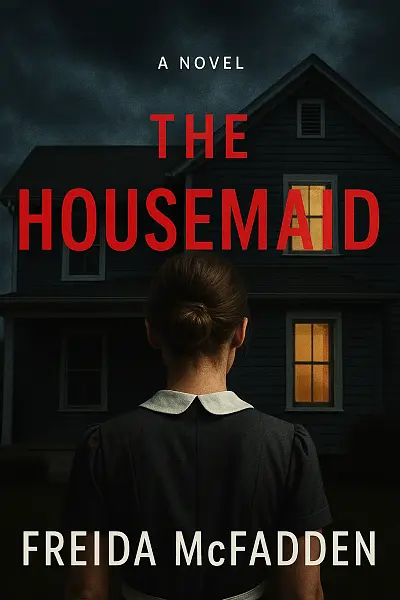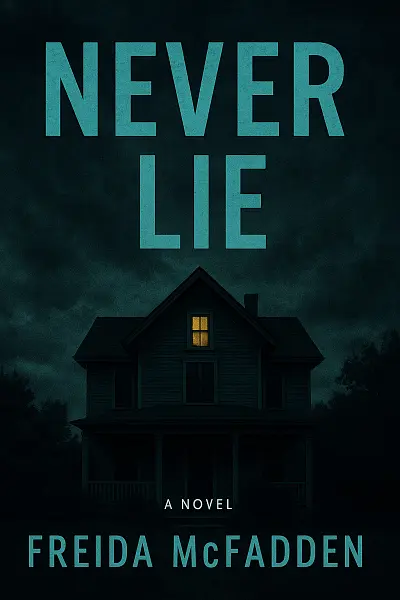
The Housemaid
by: Freida McFadden
Millie just wants a fresh start when she lands a live-in job with the wealthy Winchester family in their picture-perfect suburban home. Every day, she cleans, cooks, and tries not to notice how Nina, her demanding employer, seems to invent new ways to test her patience.
Things take a dark turn when Millie’s small act of curiosity—trying on one of Nina’s dresses—sets off a chilling chain of events. Suddenly, the house feels more like a prison, secrets simmer beneath the surface, and Millie’s safety is at stake.
Told in tight, suspenseful prose, the atmosphere is tense and claustrophobic, making you question whether Millie can outsmart the Winchesters… or if she’ll be trapped forever.
"Trust is the sharpest knife in a stranger’s home—capable of saving or destroying, depending on whose hand it’s placed in."
Let's Break This Down
The Author's Voice
Atmosphere:
- Tense and claustrophobic throughout; every page feels charged with unease and suspicion
- Domestic settings become unsettling, with ordinary rooms and routines quietly laced with dread
- Suburban perfection masks something sinister—a creeping darkness just beneath the surface
- Expect a persistent sense of paranoia, accented by moments of sharp fear
Prose Style:
- Direct, highly accessible, and almost conversational—easy to fly through pages
- Short chapters and crisp sentences, avoiding flowery language or heavy exposition
- Relies heavily on internal monologue to draw readers deep into the protagonist’s unsettled mind
- The writing is more functional than literary, with an emphasis on clarity and suspense over poetic phrasing
Pacing:
- Snappy and relentless—rarely a slow moment
- Chapters leave you hanging, making it almost impossible not to keep reading just “one more”
- Twists arrive rapidly and frequently, fueling a binge-worthy momentum
- Suspense is expertly maintained, with tension cranked up just when you catch your breath
Dialogue:
- Sharp, straightforward, and loaded with double-meaning
- Exchanges between characters are packed with subtext and unease, often hinting at hidden agendas
- Realistic but heightened, landing that thriller sweet spot between believability and drama
Characterization:
- The focus sticks tightly to the protagonist, immersing you in her anxiety and confusion
- Secondary characters are seen through her wary eyes, often appearing enigmatic or threatening
- Motivations unfold gradually, making even domestic scenes suspect
- Psychological undercurrents rather than lengthy backstory
Mood & Feel:
- Intensely readable, deeply immersive—think popcorn thriller with genuine psychological edge
- Paranoia and urgency pervade, provoking lots of what is really going on here? moments
- Not cozy or comforting—this is all about edge-of-your-seat suspense
Overall Rhythm:
- Expect a pulse-racing, roller-coaster narrative designed to keep you off-balance
- Ideal for those who love twisty, fast-moving psychological suspense you can’t put down
Key Moments
-
That “locked bedroom” moment—chills guaranteed when secrets start oozing through the wallpaper
-
Millie’s raw, anxious inner voice—so real it’ll have you double-checking your own front door
-
Verbal cat-and-mouse between Millie and Mrs. Winchester: deliciously tense, with venom in every smile
-
Chapter 33’s “wait, WHAT just happened?” reveal—totally upends everything you thought you knew
-
Psychological suspense meets social commentary, poking at class divides behind manicured hedges
-
Twisty plotting that refuses to let you set the book down after “just one more chapter”
-
Final act revenge fantasy that somehow feels both satisfyingly outrageous and disturbingly possible
Plot Summary
The Housemaid follows Millie, a young woman recently down on her luck who seizes a job as a live-in housemaid for the wealthy Winchester family. What starts as a promising new chapter quickly turns sinister—the home’s matriarch, Nina, runs hot and cold, manipulating and gaslighting Millie at every turn, while Andrew, the seemingly caring husband, is even more dangerous than he first appears. As Millie uncovers the family’s deeply buried secrets, including the true extent of Andrew’s abuse and Nina’s desperate actions to protect herself and her daughter, she finds herself caught in a deadly game. The story’s pulse-pounding climax sees Millie and Nina teaming up to take down Andrew, flipping the narrative of victimhood and power. Ultimately, Millie escapes the toxic household with her life, while Nina gains the freedom she so desperately sought.
Character Analysis
Millie begins as a vulnerable, determined woman seeking stability; her resilience and resourcefulness bloom as she navigates the Winchesters’ twisted dynamics. Nina is initially presented as volatile and possibly unhinged, but as layers peel away, she becomes a sympathetic figure—a woman mothering through trauma, grappling with her own survival and her daughter’s safety. Andrew, outwardly affable and respectable, turns out to be manipulative, violent, and the true villain; his charming exterior masks terrifying control issues. Over the course of the novel, these characters subvert initial impressions, morphing from archetypes into complex, flawed individuals whose shifting alliances and hidden depths keep readers guessing.
Major Themes
The novel digs into themes of power, manipulation, and female agency—showing how society underestimates women’s strength while highlighting the insidious nature of domestic abuse. There’s a pointed critique of socioeconomic disparities; Millie’s desperation for employment exposes how the desperate can be easily exploited by the wealthy and powerful. McFadden also explores trust and deception: the story is full of secrets, false fronts, and the question of who, if anyone, can be trusted in a world where appearances mean everything. The stunning reversal at the end underscores the message that even in situations of apparent helplessness, there is room for cunning and resistance.
Literary Techniques & Style
Freida McFadden’s narrative is brisk, suspenseful, and intensely psychological, with tight pacing that keeps chapters flying by. She favors a direct, conversational prose style, using Millie’s first-person perspective to immerse readers in her paranoia and confusion. Symbolism is subtle but present—locked doors, mirrors, and the secluded house reinforce themes of secrecy and entrapment. The author skillfully employs red herrings and strategic misdirection, cleverly leading us to misjudge characters and motivations—a hallmark of effective psychological thrillers.
Historical/Cultural Context
Set in a contemporary upper-middle-class American suburb, the story mines current anxieties about class, gender roles, and power in domestic spaces. The Winchesters’ wealth and privilege highlight societal divisions and the hidden dysfunctions often masked by a picture-perfect appearance. McFadden taps into the recent cultural focus on gaslighting, coercive control, and the fraught dynamics within seemingly perfect families—a theme increasingly visible in current popular fiction.
Critical Significance & Impact
The Housemaid has become a standout in the modern psychological thriller genre, praised for its page-turning tension and unsettling twists. Its popularity reflects readers’ appetite for suspenseful, character-driven stories featuring women outwitting their oppressors. Though some critics argue the book’s prose is workmanlike and the plot relies on genre conventions, its addictive momentum and satisfying, empowering resolution have earned it lasting appeal—especially for fans of domestic suspense exploring the dark corners of ordinary lives.

Secrets simmer behind every door—trust the wrong person and pay the price.
What Readers Are Saying
Right for You If
If you’re into twisty psychological thrillers, The Housemaid is honestly a no-brainer. Fans of books like The Girl on the Train or Behind Closed Doors will absolutely eat this up—it’s got those juicy secrets, nerve-wracking suspense, and characters you just love to second-guess. If you get a kick out of unreliable narrators or you love trying to outsmart the plot before everything clicks into place, this is your kind of book.
But hey, if you’re more into slow-burn literary fiction or you get annoyed by over-the-top drama, you might want to sit this one out. The story doesn’t waste time getting to the action and there’s definitely a lot of tension and “Oh no she didn’t!” moments. If you’re looking for deep, subtle character studies or poetic writing, you’re probably going to have mixed feelings here.
Honestly, if you just want to get swept up in a fast-paced, unputdownable read with plenty of shocking reveals, The Housemaid is a total winner. Thriller lovers, binge readers, and anyone who enjoys a slightly dark but totally entertaining ride—go for it! If you need your fiction more realistic or mellow… maybe try something else this time.
What You're Getting Into
Looking for a fast-paced psychological thriller with jaw-dropping twists?
The Housemaid by Freida McFadden follows Millie, a desperate young woman who accepts a job as a live-in maid for the wealthy Winchester family—only to discover that their perfect home hides some seriously dark secrets.
You’ll be on edge as Millie gets pulled deeper into their web, questioning who she can trust, and realizing that her dream job might just become her worst nightmare.
It’s creepy, addictive, and has that irresistible “just one more chapter” vibe from the very first page!
Characters You'll Meet
-
Millie Calloway: The resourceful protagonist and newly hired housemaid, Millie’s desperate circumstances push her into a mysterious and dangerous job, where she must navigate secrets and deception.
-
Nina Winchester: The wealthy and enigmatic employer, Nina oscillates between friendliness and manipulation, drawing Millie into the twisted dynamics of the Winchester household.
-
Andrew Winchester: Nina’s husband, outwardly charming and supportive, whose true nature becomes critical to the story’s mounting suspense and shifting alliances.
-
Cecelia Winchester: Nina and Andrew’s peculiar young daughter, whose strange behavior adds to the novel’s tension and sense of unease.
-
Enzo: The Winchester family’s handyman, a subtle but important presence who provides Millie with moments of kindness and hints at the underlying dangers in the house.
More Like This
If psychological thrillers are your jam, The Housemaid by Freida McFadden will probably send chills up your spine much like The Girl on the Train by Paula Hawkins did. Both books feature unreliable narrators plunged into the heart of domestic chaos, with secrets lurking behind every polite smile. The sense of never really knowing who to trust keeps the tension taut, twisting readers’ expectations with every page.
In another vein, fans of Ruth Ware’s The Woman in Cabin 10 will find familiar thrills here too. There’s a palpable claustrophobia and creeping sense of dread that comes from being trapped in a seemingly luxurious environment—whether it's a high-end yacht or a pristine house—where the allure of privilege conceals dangerous undercurrents. The escalating paranoia and everydoor-might-be-hiding-something atmosphere draw sharp parallels between the two.
If you're more of a screen buff, imagine the slow-burning tension and “what is actually going on in this house?” doubt that made HBO’s Big Little Lies so addictive. Like that series, McFadden’s novel skillfully peels back layers of polished domesticity to reveal the darkness lurking underneath, blending psychological suspense with just the right dose of juicy scandal. The result is a twisty, page-turning experience with the same irresistible, binge-worthy quality.
Critic's Corner
What do we owe one another when the lines between service, trust, and survival blur? Freida McFadden’s The Housemaid catapults us into the claustrophobic microcosm of domestic employment, where moral boundaries buckle under psychological pressure. At its core, the novel prods our discomfort with secrecy and privilege—forcing us to confront what happens when personal history collides with the façade of upper-middle-class perfection.
McFadden’s writing style is deliberately taut, anchored in brisk, present-tense prose that keeps tension simmering on every page. She favors short, punchy sentences that match the protagonist’s anxious inner world, embedding urgency into even the most mundane domestic tasks. Narrative perspective is narrowly focused—we experience the house through the housemaid's gaze, making every dust mote and side glance drip with suspense. McFadden eschews lyrical flourishes for stark, utilitarian language, a choice that amplifies atmosphere over introspection. The dialogue is razor-edged, almost clinical, revealing characters’ duplicity in just a few well-placed lines. While the pacing rarely staggers (each chapter is a page-turner), sometimes the relentless momentum leaves little space for quieter emotional development. Still, her mastery in drip-feeding unsettling details—those odd smudges, the locked doors, the half-truths—creates an escalating sense of dread that thriller fans will relish.
At its heart, The Housemaid interrogates themes of power, agency, and class. This is a story about invisible labor and emotional exploitation, exposing how privilege manifests not only in wealth but in manipulation and the casual wielding of control. The protagonist’s yearning for “a better life” serves as a razor-sharp commentary on the American Dream: how proximity to luxury can both seduce and destroy. McFadden unflinchingly explores cycles of trauma and deceit, crafting characters whose motivations remain twisted by their own pain. In our era of social stratification and performative family “perfection,” the book’s focus on microaggressions and unspoken tension feels deeply relevant. It asks: Can we ever truly escape our pasts, or does servitude simply take different forms?
In the landscape of modern psychological thrillers, The Housemaid stands out for its relentless momentum and claustrophobic intimacy. Compared to McFadden’s other novels, it is perhaps her most focused meditation on domestic darkness. Fans of Ruth Ware and B.A. Paris will recognize familiar tropes—unreliable narrators, fragile marriages, and the ever-present threat hidden in everyday routine—but McFadden forges her own path by centering the invisible worker rather than the “lady of the house.” Within its genre, the novel is less a whodunit than a chilling exploration of why, and just how far, people will go to protect or upend the status quo.
Strengths:
- Atmosphere-heavy suspense
- Clever psychological maneuvering
- Timely social commentary
Weaknesses:
- Some emotional beats underexplored
- Occasional predictability in twists
Final verdict: The Housemaid is a slick, addictive thriller that burrows under your skin—not perfect, but perfectly unsettling, and a razor-sharp reminder that no locked door stays shut forever.
Community Thoughts
Why did I think I could read this before bed? Millie’s secrets kept me up, I literally stared at my ceiling for hours. That last twist messed with my brain. Not sleeping tonight, thanks Freida!
Why did I keep reading after that dinner scene? Mrs. Winchester's icy stare still pops into my head at the worst moments. How can a character feel so real and terrifying? I probably need therapy now.
I finished The Housemaid at 2am and literally couldn’t sleep after. The twists kept looping in my head, especially Millie’s choices in THAT room. Freida McFadden, what did you do to my nerves?
so i picked this up thinking “just one chapter before bed” and suddenly it’s 3AM and i’m staring at my ceiling, wide awake, replaying every wild twist. my sleep schedule is ruined, thanks a lot freida mcfadden
i stayed up WAY too late because of this book. Every twist made me think I could predict the next page but NOPE. Millie’s choices? Still haunting me. Why am I checking my closet at 2am now?
Leave Your Review
Local Take
Why It Matters
The Housemaid by Freida McFadden strikes a real chord with readers here, thanks to its gritty dive into class tension and the secrets hidden behind closed doors. In a culture where upward mobility and appearances have always been big deals, the book’s “outsider in the lavish home” setup echoes classic themes from our own literature—think tales where a working-class figure infiltrates elite spaces, shining a light on inequality.
-
Parallel to local history: Our own social movements pushing for transparency and justice give extra weight to the protagonist’s struggle for dignity and truth. Stories about “the help” confronting wealthy employers feel especially relevant, recalling real-life debates about labor rights and fairness.
-
Cultural values clash and align: The tension between loyalty, ambition, and privacy taps into our collective fascination (and discomfort) with family secrets and public personas. While local traditions treasure hospitality and respect for the home, The Housemaid gleefully disrupts these norms—making the plot’s betrayals and revelations hit even harder.
-
Literary echoes: Fans of domestic suspense here love the subversive legacy of writers who challenge our trust in safe spaces, so McFadden’s twisty, fast-paced thriller style fits snugly within that ongoing tradition—while upping the ante with its raw, modern edge.
Food for Thought
Notable Achievement & Cultural Impact
The Housemaid by Freida McFadden has become a massive hit in the psychological thriller genre, earning a spot on bestseller lists and captivating a devoted readership worldwide. Its unputdownable suspense and twisty plot have made it a wildly popular book club pick and a buzzworthy recommendation across TikTok, Goodreads, and social media, helping to cement Freida McFadden’s status as a leading voice in contemporary thrillers.
Like what you see? Share it with other readers







